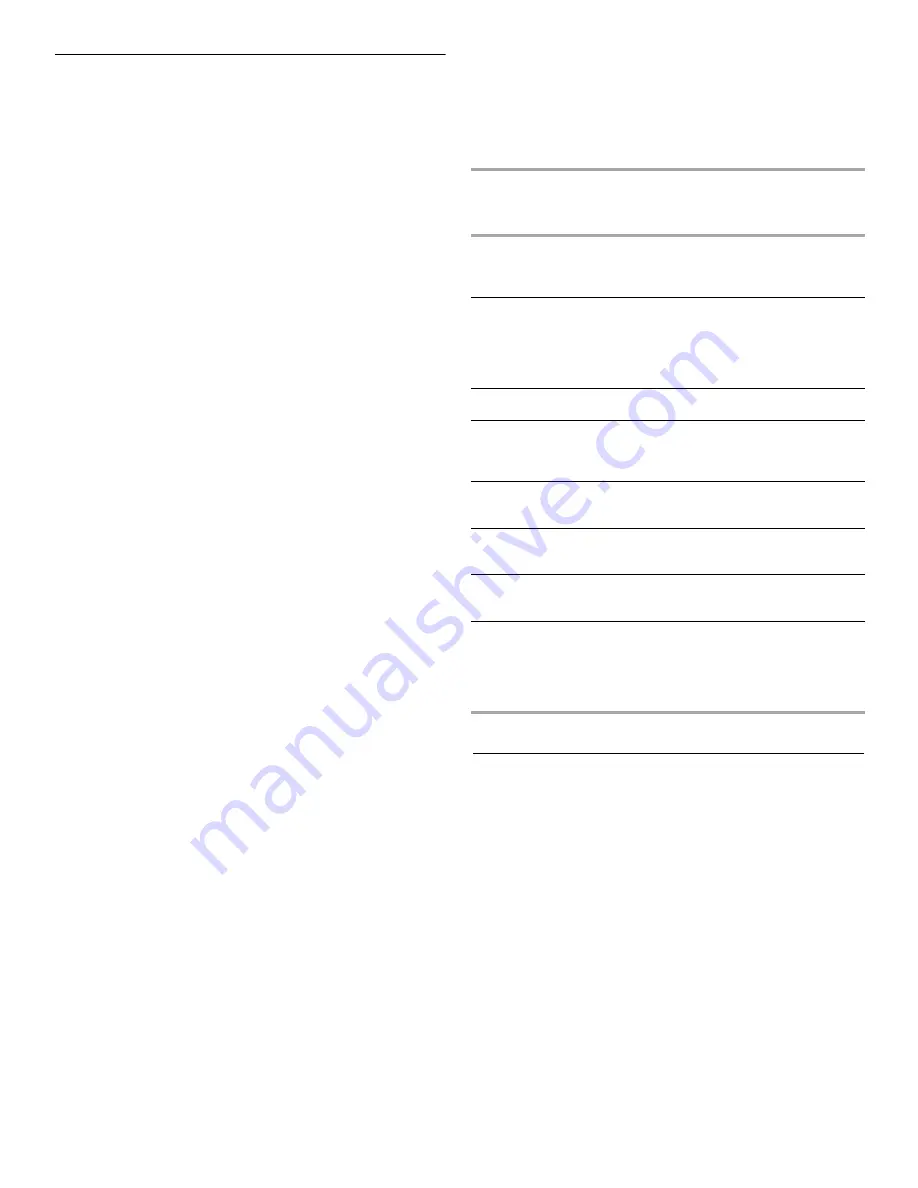
12
Custom Broil
The top element operates at full power when heating.
Use this setting for normal broiling and top browning with the
door open in the Broil Stop position.
■
Use only the broiler pan and grid provided with the appliance.
It is designed to drain juices and help prevent spatter and
smoke.
■
For proper draining, do not cover the grid with foil. The
bottom of the pan may be lined with aluminum foil for easier
cleaning.
■
Trim excess fat to reduce spattering. Slit the remaining fat on
the edges to prevent curling.
■
Pull out oven rack to stop position before turning or removing
food. Use tongs to turn food to avoid the loss of juices. Very
thin cuts of fish, poultry or meat may not need to be turned.
■
After broiling, remove the pan from the oven when removing
the food. Drippings will bake on the pan if left in the heated
oven, making cleaning more difficult.
To Broil:
Before broiling, position the rack according to the Broiling Chart.
Position food on the grid in the broiler pan, then place it in the
center of the oven rack with the longest side parallel to the door.
It is not necessary to preheat the oven before putting food in,
unless it is recommended in the recipe.
Leave the door partly open when you use the oven to broil. This
allows the oven to stay at the proper temperature.
1. Press CUSTOM BROIL.
2. Press START.
The set oven temperature will appear on the display until the
oven is turned off.
3. Press OFF/CANCEL when finished cooking.
To Vari Broil:
Changing the temperature when custom broiling allows more
precise control when cooking. The lower the temperature, the
slower the cooking. Thicker cuts and unevenly shaped pieces of
meat, fish and poultry may cook better at lower broiling
temperatures.
1. Press CUSTOM BROIL.
Press the TEMP “up” or “down” arrow pads (buttons) to enter
a temperature other than 500°F (260°C). The broil range can
be set between 300°F (150°C) and 525°F (275°C).
2. Press START.
The set oven temperature will appear on the oven display
until the oven is turned off.
3. Press OFF/CANCEL when finished cooking.
BROILING CHART
For best results, place food 3” (7 cm) or more from the broil
element. Times are guidelines only and may need to be adjusted
for individual foods and tastes. Recommended rack positions are
numbered from the bottom (1) to the top (4). Do not use position
5. For diagram, see the “Positioning Racks and Bakeware”
section.
Convection Cooking
(on some models)
In a convection oven, the fan-circulated hot air continually
distributes heat more evenly than the natural movement of air in a
standard thermal oven. This movement of hot air maintains a
consistent temperature throughout the oven, cooking foods more
evenly, crisping surfaces while sealing in moisture and yielding
crustier breads.
Most foods can be cooked by lowering cooking temperatures
25°F to 50°F (14°C to 28°C) and cooking time can be shortened
by as much as 30 percent, especially for large turkeys and roasts.
■
It is important not to cover foods so that surface areas remain
exposed to the circulating air, allowing browning and crisping.
■
Keep heat loss to a minimum by opening the oven door only
when necessary.
■
Choose cookie sheets without sides and roasting pans with
lower sides to allow air to move freely around the food.
FOOD
RACK
POSITION
COOK TIME
minutes
SIDE 1 SIDE 2
Chicken
bone-in pieces
boneless breasts
3
4
17-20
11-16
17-20
11-16
Fish
Fillets
¹₄
-
¹₂
”
(.6-1.25 cm) thick
Steaks
³₄
- 1”
(2-2.5 cm) thick
4
4
8-10
16-18
4-5
8-9
Frankfurters
4
5-7
3-4
Ground meat patties*
³₄
” (2 cm) thick
well done
4
13-14
7-8
Ham slice, precooked
¹₂
” (1.25 cm) thick
4
8-10
4-5
Lamb chops
1” (2.5 cm) thick
4
14-17
8-9
Pork chops
1” (2.5 cm) thick
4
20-22
10-11
Steak
1” (2.5 cm) thick
medium rare
medium
well done
4
4
4
14-15
15-16
18-19
7-8
8-9
9-10
*Place up to 9 patties, equally spaced, on broiler grid.




















